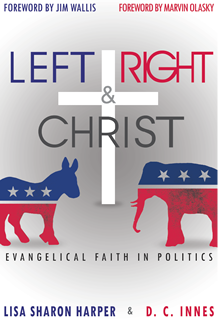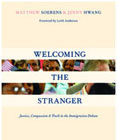This is the fourth post in an Urbana12 series by J. Nathan Matias (@natematias), Research Assistant, MIT Media Lab Center for Civic Media. This post in original form can be found here.
————————————-
This weekend, I’m at Urbana, a gathering of Christian students interested in the work of the church worldwide. Over the next few days, I will be blogging two kinds of sessions. Sessions like this morning’s gathering [12/29/2012] are intended to inspire and challenge Christian students to consider international service. This afternoon, I blogged a fascinating talk on the theological underpinnings of evangelical action on immigration.

This afternoon’s speakers are Lisa Sharon Harper and Matthew Soerens. Lisa is the director of mobilising at Sojourners, an evangelical social justice organisation. She’s also co-author of Left Right & Christ: Evangelical Faith in Politics. Matthew is the US church training specialist for World Relief, the humanitarian arm of the National Association of Evangelicals. He’s co-author of Welcoming The Stranger, which sets out an evangelical social justice case for US immigration reform, and co-creator of undocumented.tv, an evangelical immigration media activism campaign.
Lisa starts out by mentioning that the Hebrew word for immigrant, “ger,” is mentioned 92 times in the Old Testament. That fact has inspired the G92 movement, which mobilises Christian college students around immiration reform in the United States. Matt and Lisa are also part of the Evangelical Immigration Table, which brings together organisations like the National Evangelicals Association, the Southern Baptist Convention, World Vision, Bread For the World, Sojourners, and many others, including the National Latino Evangelical Coalition. The Evangelical Immigration Table recently launched a new immigration reform initiative. People across the evangelical world came together to say, “just immigration reform this matters to us.”
Lisa explains why immigration matters to evangelicals. Starting with Genesis 1, she sets out a vision for the relationship between Christianity and politics. In the beginning, God called the world a good thing. The relationships among people and the relationship between humanity and its governing systems were “forcefully good.” Furthermore, humans were made in the image of God. We were created to be “markers of where God rules,” she says. Humans are to be stewards of the world we live in, and the fall of humanity in Genesis shattered the relationship between systems and the people they govern. Humans are made in the image of God. As a result, the way humans rule should follow the manner of God’s rule. That’s why we Christians should care about issues like immigration, Lisa says.
Migration, Lisa tells us, is one of God’s first commands to humanity, to be fruitful, multiply, and fill the earth. An early immigrant story appears in Genesis 12, when Abraham and his wife Sarai spend time in Egypt. In the story, the Egyptian Pharoah rules autocratically. In that environment, Abraham is forced to lie– an act that would later be forbidden in the 10 commandments. How does God respond to Abraham’s lie? Where does it fall? It falls on Pharoah, Lisa says. The story in Genesis never condemns Abraham.
Lisa tells us that sometimes, systems bear down on humanity in such a way that people have to twist themselves in order to survive — to the point even of breaking the 10 Commandments. When God judges, it always falls on those who create those systems.
The books of Moses establish the basis of a Christian theology of immigration. We should not oppress sojourners, and the alien that resides with you shall be to you as the citizen; “you shall love the alien as yourself… I am the Lord your God.”

Matt is up next. Growing up, he never thought that the Bible had much to say about immigration. After he started working on immigrant issues, he found it throughout the Bible. Many of the major characters in the Bible are immigrants, Abraham, Joseph, Rebekah, David, Ruth, and Paul. These characters flee famine. They’re victims of human trafficking. Some are family based immigrants. Others are asylum seekers. St Paul was a highly skilled employment-based immigrant.
Matt runs through the rules in the Old Testament and how they relate to immigrants. The Old Testament also instructs people to remember their own immigrant history. In Exodus 23:9, we read that “you must not oppress foreigners, You know what it’s like to be a foreigner, for you yourselves were once foreigners in the land of Egypt.” Most North American Christians also have immigrant histories, he reminds us. We should remember that history and allow to inform the way we treat immigrants. Throughout the Bible, God recognizes immigrants as uniquely vulnerable, alongside the fatherless and the widow (Ps 146.9, Zech 7:10, Jeremiah 7:6, Ezekiel 22:7, Malachi 3:5, Deuteronomy 24:21)
“How many of you knew that Jesus was an immigrant?” asks Lisa. In the most esoteric sense, Jesus was God in heaven who emigrated to earth. In Matthew 2, Jesus is an asylum seeker in Egypt. In today’s terms, Jesus would be a dreamer. Lisa also directs us to Matthew 25. The people who Jesus welcomes are people “of equitable action and character” who welcome strangers and work toward a just and welcoming society.
Should Christians really relate with “illegal immigrants?” Aren’t Christians commanded to be subject to civil authorities? Firstly, St Paul is writing this from jail. When he says that Christians are to be subject to civil authorities, he’s not telling us to mindlessly obey. Secondly, it’s in the context of Romans 12, which tells us not to conform ourselves to the ways of the world. Immediately after this instruction, Paul writes that all commandments are summed up in the commandment to love our neighbour and do them no wrong. Paul also assumes that rules are “not a terror to good conduct but to bad.” That’s not always the case.
What should we do when governments affirm and cultivate terror? There is good law and bad law. Good laws preserve people’s agency, their ability to make decisions that impact their lives. Bad laws like antebellum slavery, Jim Crow, the Chinese exclusion act of the 1880s, and Arizona’s SB1070 are all bad laws. When power strays from what it is appointed to do, we confront authorities.
Lisa points out a difference between resistance and confrontation. Resistance disregards the power of rulers to implement their laws. Jesus didn’t resist To confront authorities is to declare to powers that there is a law that is higher that their law. The Quakers broke the law by allowing “property” to escape; they could have been prosecuted for stealing. Pastors in Alabama and Arizona are having to break the law as they choose to transport their own congregants, who might be undocumented. They’re doing that in respect to a higher law.
Matt comes back to the discussion on Romans 13. In the US around 11.5 million people, around 33% of American’s immigrants, are here unlawfully. Many Christians feel a tension between their love for immigrants and the constraints of law. To answer this, we need to be aware of the law:
- There’s not a lot of law for us to break. Just about the only thing that’s unlawful is to hire someone.
- That might change. In the State of Arizona, SB1070 states that if you transport someone in furtherance of their unlawful status, you might be breaking the law. A judge might conclude that driving someone to an ESL class might be unlawful. Some churches have stopped their transportation services in response. Others continue to drive, choosing to “obey God rather than men.”
- Many undocumented believers struggle with Romans 13. In most cases, there’s no way for people to sort their status out with the government. People want to follow the law, but they also want to provide for their families, which is another command in the Bible.
- Christians should work together to change policy. The current immigration system, says Matt, makes a mockery of the law. It’s a system that theoretically would kick out 11.5 million people, which is absurd.
A comprehensive immigration reform should make it harder to immigrate unlawfully. It should also make it easier to immigrate lawfully, meeting the needs of the US labor market and economy. The US permits around 5,000 unskilled immigrants a year, which is the number that the US once admitted per day. Next immigration law should keep families together. Finally, new laws should allow the undocumented to come forward, pay a fine for having violated the law, and earn permanent legal status and eventual citizenship.
Matt argues that immigration is an important topic for the church because it’s an opportunity for missions. Christians have been given the task of sharing the gospel with people of every nation. Immigrants are also agents of mission themselves, bringing their faith to their host countries.
People don’t expect evangelical Christians to advocate on the behalf of immigrants. Lots of churches send the wrong message, giving people the impression that they hate immigrants. Sometimes they do. We can change that.
What You Can Do
Lisa talks to us about the G92 movement. She tells us about the G92 conference at Cedarville University last year, looking at the interaction between systems and the faith life of communities. Their first topic was immigration reform. Since then, Sanford, Concordia, Biola, and several other evangelical schools are now starting similar events.
To pray and learn, text “G92” to 877877 to learn about the “I was a Stranger…” Challenge, which culminates in a “gathering” in Washington D.C.
Editor Note: Audio for Thinking Theologically about Immigration by Lisa Sharon Harper & Matthew Soerens is now available at https://urbana.org/urbana-12/seminars.
J. Nathan Matias (@natematias), who recently completed a PhD at the MIT Media Lab and Center for Civic Media, researches factors that contribute to flourishing participation online, developing tested ideas for safe, fair, creative, and effective societies. Starting in September 2017, Nathan will be a post-doctoral researcher at the Princeton Center for Information Technology Policy, as well as the departments of psychology and sociology department
Nathan has a background in technology startups and charities focused on creative learning, journalism, and civic life. He was a Davies-Jackson Scholar at the University of Cambridge from 2006-2008.

Leave a Reply